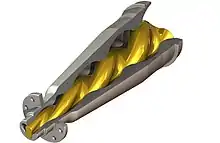Conical screw compressor
The relatively recently developed conical screw compressor is a type of rotary-screw compressor using a different topology from the typical dual-screw type, in effect it is a conical spiral extension of a gerotor. Because of this it does not have the inherent "blow-hole" leakage path which in typical screw compressors is responsible for significant leakage through the assembly and makes low-speed operation impractical. This theoretically allows much smaller rotors to have practical efficiency since at smaller sizes the leakage area does not become as large a portion of the pumping area as in straight screw compressors. In conjunction with the decreasing diameter of the cone shaped rotor this may also allows much higher compression ratios to be achieved in a single stage.[1][2]


A significant impediment to production is the machining of the outer rotor to the tolerances required, although the inner rotor can be manufactured with precise CNC machines without much difficulty the outer rotor presents significant difficulties due to the restricted access to the interior for precision tooling, and assembling the outer rotor from easier to machine segments presents its own problems. The cost of units is currently very high, but development is ongoing, development is primarily being performed by VERT Rotors who hold patents on this topology.
References
- Dmitriev, Olly; Tabota, Eugene; Euring, Ian Arbon; Fimeche, Ceng (2 Feb 2020). "A miniature Rotary Compressor with a 1:10 compression ratio". IOP Conference Series: Materials Science and Engineering. 90: 012055. doi:10.1088/1757-899X/90/1/012055.
- Dmitriev, Olly (2017). "Comparison of energy-efficiency and size of portable oil-free screw and scroll compressors". IOP Conference Series: Materials Science and Engineering. 232: 012057. doi:10.1088/1757-899X/232/1/012057.